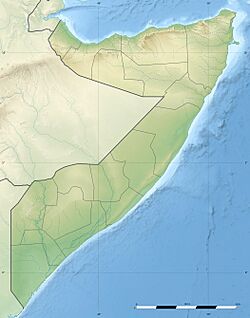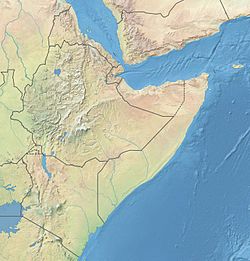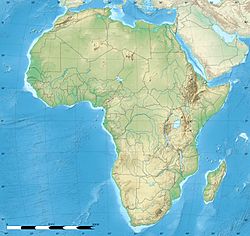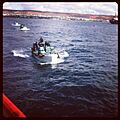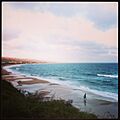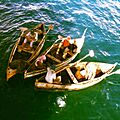Barawa facts for kids
Quick facts for kids
Barawa
Barawy
Baraawe بَرَأَاوٖ Barāwa ﺑَﺮَﺍﻭَة
|
|
|---|---|
|
Capital City of South West Somalia State
|
|
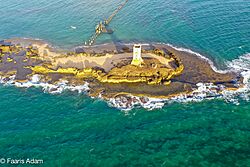
Barawa Beach-front
|
|
| Nickname(s):
Brava Ierè
|
|
| Country | |
| State | |
| Region | Lower Shabelle |
| Districts | Barawa District |
| Elevation | 0 m (0 ft) |
| Population | |
| • Total | 678,890 |
| Time zone | UTC+3 (EAT) |
| Area code(s) | +252 |
Barawa (Somali: بَراوِّ Barāwe, Maay: Barawy, Swahili: بَرَأَاوٖ Baraawe, Arabic: ﺑﺮﺍﻭة Barāwa), also called Barawe or Brava, is an important port city in Somalia. It is the capital of the South West State of Somalia. Barawa is located in the southwestern Lower Shebelle region, right on the coast of the Indian Ocean. It serves as the main port for the South West State.
Contents
History of Barawa
How Barawa Started
The city of Barawa was founded by a man named Aw-Ali. He was from the Tunni clan, which is part of the Rahanweyn group. Aw-Ali was looking for a good place for his family to live. He loved the fresh ocean breeze near the coast.
He asked his people to help him build a new home there. Before this, many Tunni people lived nearby with their animals. Historians believe Aw-Ali was indeed from the Tunni clan.
After Aw-Ali started building, more Tunni people moved to the area. They came from both inland and the coast. Oral stories say these Tunni were the first people to live in the city of Brava.
Barawa in Medieval Times
Barawa was an important city during medieval times. It was part of powerful sultanates (kingdoms).
Tunni Sultanate
The Tunni people formed their own kingdom called the Tunni Sultanate. They made a deal with another group, the Jiddu. The Tunni settled on one side of the Shabelle River, and the Jiddu on the other.
They agreed to work together against outsiders. However, they welcomed the first Muslim travelers from Yemen and Syria around the 10th century. These newcomers brought new ideas and trade.
Barawa became the capital of the Tunni Sultanate. The city grew and became a major center for Islamic learning in the Horn of Africa. Scholars from all over the region came to study there.
Writers like Ibn Sa'id al-Maghribi called Barawa "an Islamic island on the Somali coast." Another writer, Al-Idrisi, noted its beautiful coral houses and many goods.
Barawa was famous for its skilled craftspeople. They made special alindi/kioy cloth and kufi baraawa hats. They also made sandals, weapons, and tools by hand.
People in Barawa were also good at carving wood, like the mihmil (a stand for the Quran). They also made fine jewelry from precious metals.
Ajuran Sultanate
Barawa and the areas around it became part of the Ajuran Empire. This empire ruled a large part of southern Somalia and eastern Ethiopia.
Barawa was at its best during the Ajuran period. In the 13th century, Ibn Sa'id al-Maghribi said Barawa was one of the three most important cities on the East African coast. The others were Mogadishu and Merca. All three were important for trade and Islamic studies in the Indian Ocean.
In 1430, Barawa was even mentioned by name in a Chinese imperial order. It was called Pu-la-wa. A Chinese sailor named Fei Xin, who visited in the early 15th century, described the people of Barawa as honest.
In 1506, the Portuguese Empire tried to take over Barawa. The Portuguese commander, Tristão da Cunha, wanted to conquer the Ajuran lands. The Portuguese soldiers burned and looted the city.
However, the local people fought back bravely. The Portuguese could not keep control of Barawa. People who had left the city eventually came back and rebuilt it. Barawa quickly recovered from the attack.
Barawa in Recent History
In more recent times, Barawa was ruled by the Geledi Sultanate. It was the main port for this kingdom. Most of the people in the city were Somalis, especially from the Tunni clan. A smaller group was the Bravanese people.
In 1876, a British report mentioned that the Geledi Sultan's brother, Abobokur, collected taxes from Barawa.
Eventually, in 1908, Barawa came under Italy's control. It became part of Italian Somaliland in 1910. But many parts of the coast resisted the Italians for a long time.
A religious leader, Sheikh Uways al-Barawi, led a revolt against the Italians in 1908. He was later killed in 1909 due to religious disagreements. His followers continued his work, setting up centers for learning and helping people.
Modern Barawa
Barawa has been home to many respected scholars and poets. These include Sheikh Uways al-Barawi and the female poet-saint, Dada Masiti.
The city was a strong base for the Hizbiya Digil-Mirifle (HDM) political party, started in 1947.
Barawa's importance as a port declined when new ports were built in Merca and Mogadishu. After Somalia became independent, the government did not focus much on Barawa.
The city faced challenges during the civil war. There was damage and loss of historical items. In 1997, Barawa became part of the South West State of Somalia. Plans to rebuild were delayed by conflicts.
In 2009, a group called Al-Shabaab took control of Barawa. In October 2014, the Somali Armed Forces and AMISOM troops took back control of Barawa. After this, President Hassan banned the charcoal trade in the city.
People of Barawa
Barawa has a population of about 260,800 people. The larger Barawa District has about 350,800 residents in total.
The main group of people living in Barawa are the Tunni clan. There are also people from the Garre, Habar Gedir, and Sheekhaal clans. A smaller group are the Bravanese people.
Most people in Barawa speak the standard Somali language. The Bravanese people speak Bravanese language (Chimini), which is a dialect of Swahili. The Tunni people speak Tunni language, which is a dialect of Somali.
Gallery
See also
 In Spanish: Barāwe para niños
In Spanish: Barāwe para niños
 | Janet Taylor Pickett |
 | Synthia Saint James |
 | Howardena Pindell |
 | Faith Ringgold |


